Our favorite ADP alternative is Gusto because it has built-in time tracking, automated payroll cycles, and plenty of other comprehensive features. Start your 30-day free trial to determine whether it fits your needs.
ADP provides excellent payroll services to many small and large enterprises. Even though ADP made it to our list of top payroll service providers, it is not the only option, nor necessarily the best one for every business.
The Quick Sprout research team spent hundreds of hours analyzing many payroll service providers. After carefully studying the data and creating a criteria system, our team narrowed the list to the top five online payroll services we recommend.

The 5 Best Online Payroll Services
The best ADP alternative is Gusto, which is ideal for remote teams and provides them with several tools to manage their payroll activities seamlessly, even with a dispersed workforce. Start your 30-day free trial to see if it’s the right fit for you.
- Gusto — Best for dispersed workforces
- Paychex — Best for experienced payroll teams
- OnPay — Best for simplifying all things payroll
- QuickBooks Payroll — Best for solopreneurs and small teams
- ADP — Best for never outgrowing your payroll provider
Read a detailed review of each of the mentioned payroll services here to make an informed decision for your business.
Gusto – Best for Dispersed Workforces
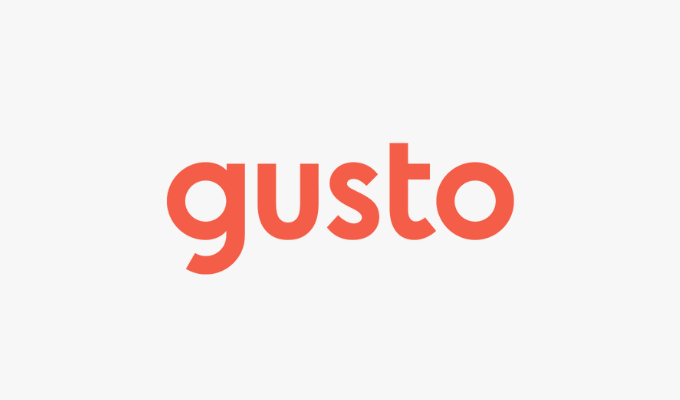
More than 200,000 businesses trust Gusto across the US for payroll processing. It offers plenty of features that help in onboarding and managing employees. It is user-friendly and ideal for new business owners without experience in bookkeeping or running payroll. Moreover, it offers elaborate customer support and guidance every step of the way.
The unique features offered by Gusto include built-in time management features, special hiring and onboarding tools, and an easy-to-use interface. While some users don’t appreciate the more advanced animated cartoons, most rave about the clean illustrations offered by Gusto.
When it comes to pricing, Gusto offers three tiers: Simple, Plus, and Premium. The details for each plan are as follows:
- The Simple plan costs $40 a month and provides basic hiring and onboarding tools, employee self-service options, and essential technical support.
- The Plus plan can be availed for $80 a month and provides full payroll support, PTO management, and all the services offered in the Simple plan.
- The Premium plan has custom pricing, and you will receive a personalized price quote based on the needs of your business. Additional features only available for premium users include performance reviews, compliance alerts, and dedicated technical support.
Despite being a popular payroll service, Gusto has some drawbacks. One of the clients’ complaints includes limited integration with third-party platforms like Sage and Xero. Moreover, some complain that even though Gusto immediately responds to the client, it takes them days or even weeks to resolve a simple issue. Therefore, many are not satisfied with the efficiency of the customer support service.
How Gusto Compares to ADP
Both companies offer several similar features. Although ADP provides some unique features like legal services and advanced HR functions, Gusto takes the lead with a more comprehensive range of features. Even Gusto’s lowest plan offers tax filing, direct deposits, wage handling, workers’ compensation, and much more. ADP only provides those features to higher-tier users.
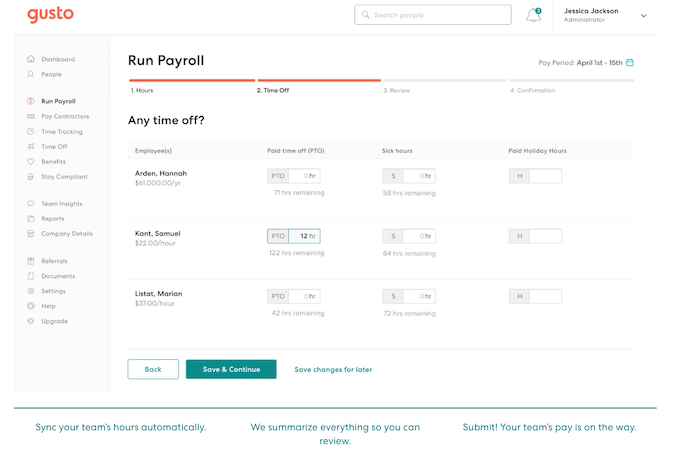
Both companies offer a similar tiered pricing model with a monthly fee and add-ons with additional charges. Gusto has a transparent pricing model, with its lowest monthly plan starting from $40.
On the other hand, ADP has a quote-based pricing system and four pricing plans. The unique quality of ADP is that it offers the first three months for free, compared to Gusto’s 30-day free trial.
Regarding customer support, ADP provides 24/7 phone and online support, but Gusto provides customer support services during set hours for five days a week.
Both platforms allow many third-party integrations and are easy to use. However, Gusto is most suitable for remote teams and companies, and ADP best suits anchored companies that want to stick to a single payroll service provider in the long run.
Read a detailed review of Gusto before choosing it as a payroll service for your business.
Paychex – Best For Experienced Payroll Teams
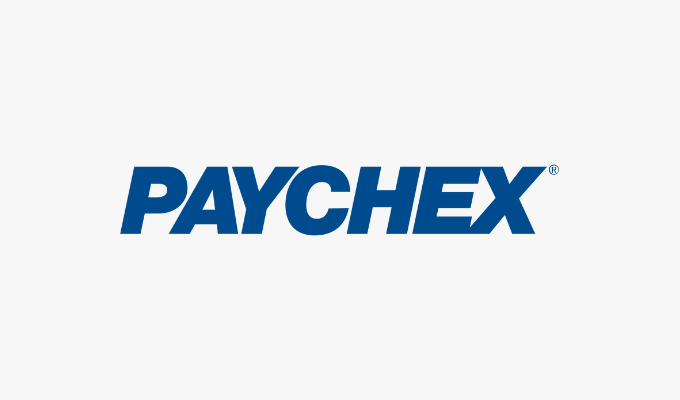
Paychex is a veteran in the payroll service industry with a history of 50 years. It offers various features like human resource management, time tracking, payroll, and benefits services. However, unlike Gusto, Paychex doesn’t believe in the hand-holding of inexperienced users and is not a good fit for people with limited payroll experience.
Even though Paychex provides excellent services to smaller businesses with as few as ten employees, it is ideal for large enterprises with many employees and complex payroll and human resource demands.
Paychex’s strengths include advanced customer service, detailed tax law knowledge regarding payroll, integrated time tracking services, and more. Paychex’s exceptional customer service provides quick and effective assistance. Another outstanding feature of Paychex is that it gives employees correct and immediate tax processing.
When it comes to pricing, Paychex offers four different subscription plans.
- Flex Essentials plan can cost $39 a month and provides the basic features.
- The Flex Select plan is available at a custom price. It includes all the essential services with the added benefit of a dedicated payroll specialist, access to e-learning services, and much more.
- The Flex Pro Plan is also available only at a custom price. Along with basic and some special features, this plan offers many features specifically designed for larger businesses.
Paychex often offers discounts on certain plans, so keep checking its website to get a good deal. Some limitations of Paychex include a complicated user interface, complex integration of various integration options, and no pricing transparency.
How Paychex Compares to ADP
Paychex and ADP are the leading payroll service providers in the US. ADP has a wide range of features beneficial for businesses of all sizes, including start-ups. Similarly, Paychex offers various features to large and small businesses but isn’t suitable for startups. Some additional features offered by Paychex that aren’t available to ADP users are a self-service portal, payroll with in-house printed checks for employees and contractors, and the option to add-on filing and reporting for payroll taxes.
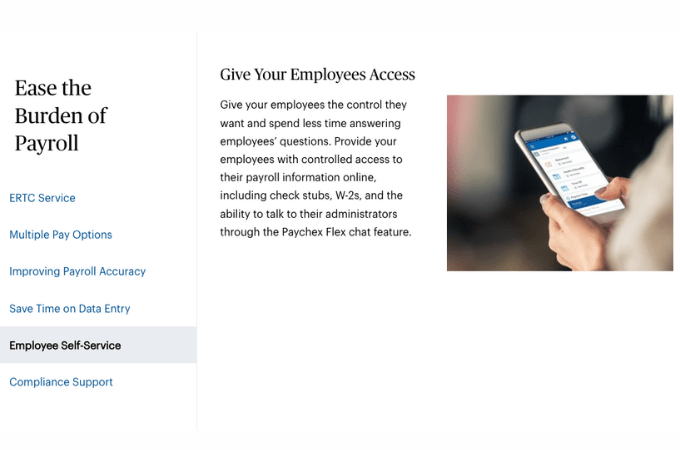
Both companies provide a similar tiered pricing model with a monthly fee and add-ons for additional charges. However, despite somewhat similar services, ADP is slightly more expensive than Paychex. Paychex has a transparent pricing model, with its lowest plan starting from $39 a month, whereas ADP has a quote-based pricing system and has four pricing plans. The unique quality of ADP is that it offers the first three months for free.
Both service providers are credible and well-established. ADP is more suitable for businesses that want a customizable payroll service platform and offers one-on-one guidance. Paychex, on the other hand, is more suited to small and medium-sized companies, but it is the ideal option for smaller businesses with a limited budget for payroll solutions.
Read a comprehensive review of Paychex to make an informed decision for your business.
OnPay – Best for Simplifying All Things Payroll
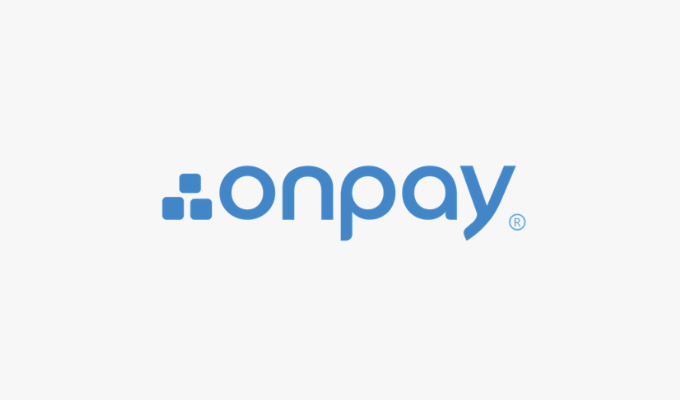
OnPay is a highly-regarded payroll service in today’s market. It is beginner-friendly and provides several excellent features like simplified employee onboarding and access features, stellar customer service, and simplified payroll management. It also offers many specific tools to small businesses, like new hire compliance reporting and customized PTO tracking.
Another exceptional feature of OnPay includes the detailed reporting functionality. Many users find the pre-built reports to be quite valuable. It also provides a custom report option with several design features to make the process easier for clients. It enables you to use a drag-and-drop interface, set up filters, and create custom views for specific users.
In terms of pricing, OnPay is straightforward. It offers services for a base monthly fee of $40 plus $6 per person per month. This pricing transparency and low monthly costs make it one of the best payroll service providers for small businesses.
However, there are some areas where OnPay still needs improvement. These include the need for an automatic payroll option, easier-to-learn functions, a mobile app, and more integration options.
How OnPay Compares to ADP
OnPay and ADP provide much the same software to help businesses manage their payroll, HR, and compliance needs. Both platforms offer similar features, but OnPay is easier to use, provides better customer support, is easier to set up, is reliable, and offers more customization options. Also, while OnPay provides multi-state payroll, new hire reporting, and many other features for free, ADP charges a specific fee for each of these add-ons.
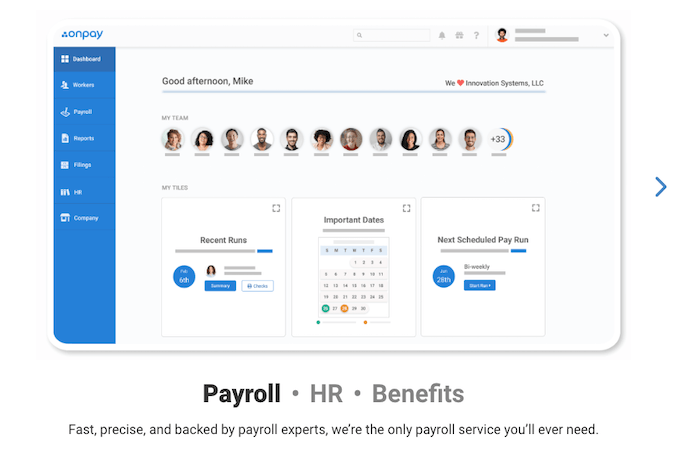
Regarding pricing, ADP offers a tiered pricing plan, but OnPay charges a single monthly fee for all the features. OnPay has a more transparent pricing plan starting from $36 a month. However, ADP requires its clients to get a price quote, making the process less transparent.
ADP and OnPay provide similar features and functions, but OnPay has better ratings and reviews and has a more affordable pricing plan. Therefore, OnPay is a better alternative, especially for small and medium-sized businesses wanting to simplify their payroll operations.
Read our detailed review of OnPay to analyze whether it fulfills your business needs.
QuickBooks Payroll – Best for Solopreneurs and Small Teams
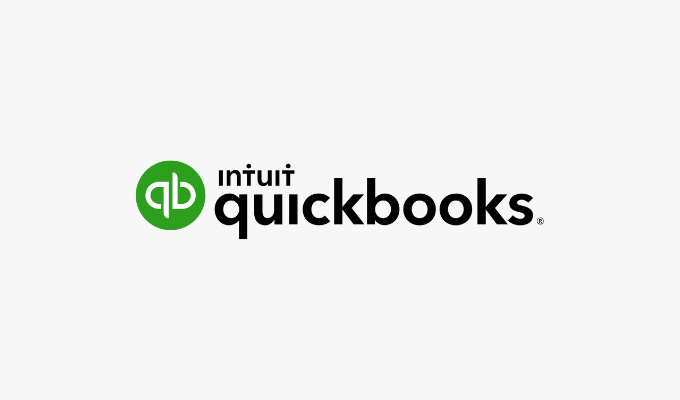
QuickBooks is a popular name in accounting software. It’s worked hard for decades to make its name as a payroll service provider by launching QuickBooks Payroll. This platform is an ideal payroll service option for businesses already using QuickBooks, as both can be integrated easily with just a click.
However, QuickBooks Payroll is equally helpful for other businesses using different accounting software. It is easy to use and gets all the necessary work done without interruptions and problems. It is a particularly ideal payroll service for individual entrepreneurs and small businesses because it’s affordable but still provides the latest functionalities.
QuickBooks Payroll is an intuitive platform that senses the expertise of its users and offers elaborate support and numerous functionalities to inexperienced users. Moreover, it protects users from tax penalties and provides a simple time-tracking feature.
The several pricing plans offered by QuickBooks include:
- The core plan starting at $45 a month, is an entry-level plan that provides auto payroll, product support, and direct deposit.
- The premium plan starting at $75 a month, provides core features, expert payroll review, and mobile time tracking.
- The elite plan, starting at $125 a month, offers additional features like HR advisory services, 24/7 customer support, expert setup, and much more.
Moreover, the company often runs promotions and discounts that can help you get a lower price on different plans.
Even though QuickBooks is excellent, it’s not perfect. Some of its failings include limited integration options, fewer human resource tools, and unsatisfactory customer service. Besides these drawbacks, some users also report the problem of integrating accounting software other than QuickBooks to be challenging.
How QuickBooks Payroll Compares to ADP
QuickBooks Payroll and ADP offer easy-to-use payroll services, including tax filing and employee management. The primary difference between both companies is in HR features. Even though QuickBooks Payroll processes payroll with unlimited pay runs, it has limited HR functionality. On the other hand, ADP is more flexible with expanded HR functions and has better plans and pay cards.
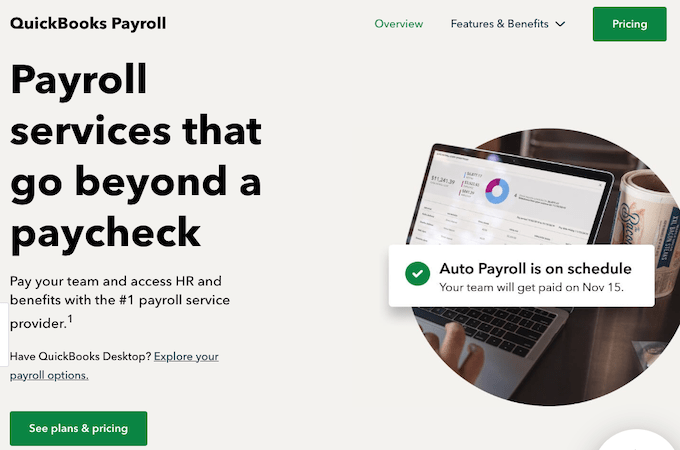
QuickBooks Payroll has four transparent pricing plans starting from $45 a month, whereas ADP necessitates getting a quote for your needs. The customer service of QuickBooks Payroll is more inconsistent and is provided only six days a week. Even though ADP offers support 24/7, customers often complain about delays and need more help. Besides that, ADP is rated higher for overall reliability and performance.
Overall, QuickBooks Payroll, with its limited integrations and HR features, is better for QuickBooks users and small businesses with a smaller budget that only requires a robust payroll solution. On the other hand, ADP is better suited for growing businesses that need a variety of payroll, HR services, and personalized assistance. Even though ADP is pricier than QuickBooks Payroll, it offers more flexible features and solutions. Therefore, carefully assess the needs of your business and your budget before choosing either of the platforms.
